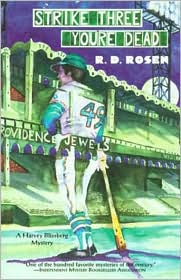
 Don't Ever Get Old by Daniel Friedman
Don't Ever Get Old by Daniel Friedman "In retrospect, it would have been better if my wife had let me stay home to see Meet the Press instead of making me schlep across town to watch Jim Wallace die." [Buck Schatz, narrator of Don't Ever Get Old.]
Yep. But Jim was afraid of dying and going to hell for the bad things he'd done. He wanted to confess and gain Buck's forgiveness. Jim was an MP, manning a road block between East and West after WWII, when up drove a disguised Heinrich Ziegler, the SS officer in charge of the POW camp where Jim and Buck were stuck in 1944. Ziegler was assumed to be dead. The trunk of his Mercedes was full of gold bars; in exchange for one, Jim let Ziegler go.
Buck is outraged, but he has no desire to hunt down Ziegler. Even if he had, Ziegler could be on any continent. When Buck retired from the Memphis Police Department in 1973, his detecting skills were state-of-the-art. That was 35 years ago, and Buck is now 87. He's never used a computer and doesn't know how to begin searching for a Nazi fugitive. He may not even be capable physically or mentally. His strength is diminishing, he's on a blood thinner, and his memory isn't what it was. Buck's grandson Tequila (William Tecumseh Friedman joined a fraternity and gained a nickname) argues that if he doesn't look for Ziegler, he's as guilty as Jim. Plus, there's that trunkload of Nazi gold to discover. When Buck gets no help from Det. Randall Jennings, Tequila announces he will use his break from law school at NYU to help Buck look.
 Despite Tequila's deficiencies in dress and physical fitness, Buck "disliked him less than most other people," maybe because he's family. Anyway, Buck has time to kill before Fox News Sunday, so he agrees to Tequila's plan. Unfortunately, as Buck and Tequila soon find out, Jim told other people about Ziegler and his missing gold bars. These folks expect Buck to take up the search, and they're scrambling to form advantageous alliances while thwarting the competition. The colorful competitors include Jim's daughter Emily and her unappetizing husband Norris; Jim's troubled minister, Dr. William Kind; T. Addleford Pratt, a debt collector from the Silver Gulch Saloon; and Yitzchak Steinblatt, who arrives in Memphis claiming to be from the Israeli Ministry for Diaspora Affairs, but who looks like an ex-KGB assassin. Speaking of assassins, someone doesn't like the idea of divvying up the treasure among so many claimants. Homicide Detective Jennings stays very busy as the search continues.
Despite Tequila's deficiencies in dress and physical fitness, Buck "disliked him less than most other people," maybe because he's family. Anyway, Buck has time to kill before Fox News Sunday, so he agrees to Tequila's plan. Unfortunately, as Buck and Tequila soon find out, Jim told other people about Ziegler and his missing gold bars. These folks expect Buck to take up the search, and they're scrambling to form advantageous alliances while thwarting the competition. The colorful competitors include Jim's daughter Emily and her unappetizing husband Norris; Jim's troubled minister, Dr. William Kind; T. Addleford Pratt, a debt collector from the Silver Gulch Saloon; and Yitzchak Steinblatt, who arrives in Memphis claiming to be from the Israeli Ministry for Diaspora Affairs, but who looks like an ex-KGB assassin. Speaking of assassins, someone doesn't like the idea of divvying up the treasure among so many claimants. Homicide Detective Jennings stays very busy as the search continues. |
| Memphis, Tennessee, is on the Mississippi River, and it's the author's hometown |
Buck is the perfect protagonist for a read in the shade. He's a cantankerous and smart man, with a sardonic sense of humor. Buck was a legendary lawman; people used to say he was the leading cause of death among Memphis scumbags from 1957 to 1962, but Buck claims he was only fourth (tied with car accidents, but behind other scumbags, drug overdoses, and other cops). For 30 years on the job, Buck thought that he was a bulwark against social breakdown and that he made a difference. Now, Det. Jennings claims the city is setting new records in violent crime. Cops keep arresting criminals, and a Guatemalan cuts Buck's grass. Life goes on without him.
Currently, Buck copes with a shrinking world. He can't drive too far without getting lost. Buck says he leads the life of an old person: "going to the same places all the time, over and over, and attending a lot of funerals." He and his wife, Rose, must be careful; a simple fall could mean disaster. At the suggestion of his physician, Buck is keeping a notebook of things he doesn't want to forget, and he shares it with the reader. One thing he wants to remember is how a professor explained the dearth of elderly movie characters. There isn't much drama to their lives. They live lives of routine. But their stories can involve powerful themes about continuity, passing along knowledge to someone younger, and death. This applies to a book's characters, as well.
 |
| Daniel Friedman |
Note: I received a free review copy of Don't Ever Get Old. It was published by Minotaur Books in May 2012. In his acknowledgments, author Friedman thanks his two sets of grandparents and his great-aunt Rose for their stories that inspired Buck and the other characters. I thank them, too.











